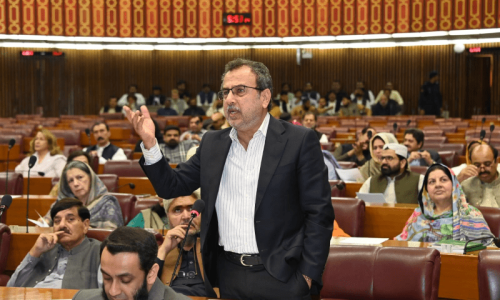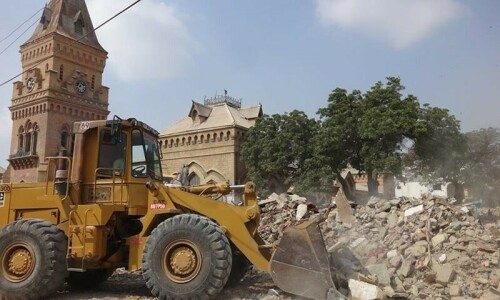KARACHI: Some people have put up dispensers in different parts of the city for the illegal retail sale of fuel while others use a small table with a few six-litre cans and 500-millilitre bottles to sell petrol of either green or orange colour.
Such makeshift facilities have long existed in Karachi and other parts of the country. The roadside stalls are mostly in areas where petrol pumps of oil marketing companies (OMCs) are situated at longer distances.
Operators of these roadside retail outlets claim that they are not selling Iranian petrol or diesel. Most of them say they buy fuel from the outlets of OMCs, especially Pakistan State Oil (PSO). Many of them also display PSO boards at their stalls.
They charge Rs80 per litre for petrol instead of Rs74 per litre being charged by OMCs. They sell half-litre petrol at Rs50.
As for higher prices, a roadside stall owner from North Nazimabad said he charges more to cover up the cost of bringing petrol from OMCs.
Some of them stay open at night by setting shop under electric poles while others light bulbs using open wires.
The operators of these stalls seem confident and operate without any fear of law enforcement agencies (LEAs). Moreover, this kind of business does not involve any big expenditure, such as purchasing land, hiring employees and paying taxes.
“I have been fighting for the last nine to 10 years on two fronts: illegal sale of Iranian oil products upcountry and roadside fuel stalls in Karachi. It seems I have lost the battle,” Pakistan Petroleum Dealers Association (PPDA) Chairman Abdul Sami Khan said.
“I have talked to senior police officers several times. They say it is not their job to curb this roadside business,” he said, adding that people transport petrol and diesel in Suzuki vans in broad daylight while the police look on.
He rejected the view that dealers are providing these makeshift outlets with petrol in bulk, especially in six-litre bottles. “Our dealers do not sell petrol in large bottles. People usually go to pumps to buy one or two litres of petrol for generator use,” he said.
He claimed that smuggled Iranian petrol is not available in Karachi, adding that the product is mostly sold in Balochistan, which shares a border with Iran.
Iranian petrol is also available in other provinces. He said there is a difference of six to seven rupees per litre in the prices of locally produced petrol and Iranian petrol. The difference in the diesel price is two to three rupees per litre.
Oil Companies Advisory Council (OCAC) CEO Ilyas Fazil said curbing the menace of smuggling is the responsibility of LEAs and the customs.
In 2014, Karachi’s Collector of Customs (Preventive) in collaboration with the civil administration and LEAs launched a successful drive to counter the illegal sale of fuel. As a result, 57 illegal retail outlets were demolished in different areas of the city. These illegal retail outlets were selling smuggled products, which were substandard and causing a loss to the national exchequer.
He said illegal retail outlets are those that do not belong to registered and licensed OMCs.
The OCAC had also asked LEAs to extend the operation to border areas to curb smuggling besides calling for the implementation of an ongoing monitoring system to prevent the re-emergence of illegal retail outlets, the OCAC CEO said.
Mr Fazil said the local administration must act against these illegal traders. OCAC members have their own system of curbing the illegal sale of fuel, he said.
He said roadside stalls exist on government land that falls under the jurisdiction of the local administration. The success of the Capital Development Authority (CDA) in Islamabad against illegal petrol trade should be emulated elsewhere also, he said.
In reply to a question about the price difference in smuggled and locally produced fuel, he said no data is available to support this view. However, a differential of Rs10-20 per litre has been cited as the key incentive for those people who buy fuel from illegal retail outlets.
An official at PSO said the company’s name is misused by the sellers of illegal fuel. “We have taken a legal course of action against such illegal acts.”
He said the quality of smuggled fuel is inferior to that of locally produced diesel and petrol.
The influx of smuggled fuel is causing a loss to the government in terms of taxes and duties. For example, the official price of diesel is Rs83 per litre in which total taxes amount to Rs33.71 per litre.
Similarly, total taxes amount to Rs23.48 in the official petrol price of Rs74 per litre.
Published in Dawn, May 7th, 2017















































